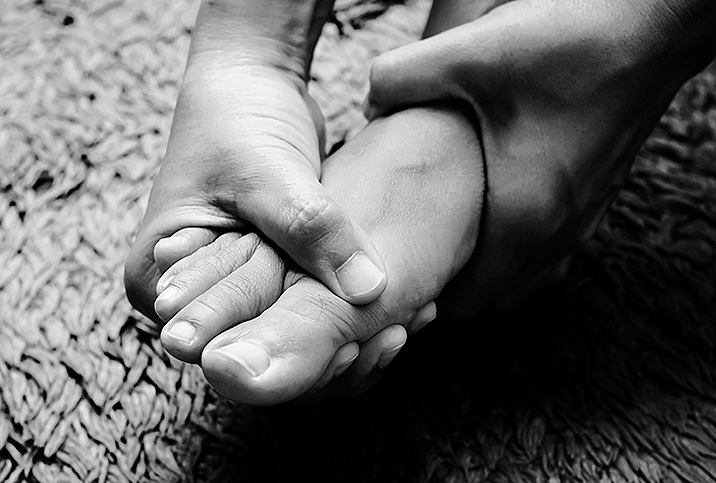Can Diabetic Neuropathy Cause Testicular Pain?

It's no secret to people equipped with such assets that the testicles are one (or two) of the most sensitive spots on the body.
But testicle pain isn't solely associated with traumatic impact or testicular conditions such as cancer or epididymitis. The body is a network of interconnected parts, and conditions that affect one part of the system can sometimes impact other areas in direct or indirect ways.
Could your testicle pain be a sign of diabetes? If you're living with diabetes, should you be aware of its connection to testicle pain or should you be ready to explore other possibilities if unexplained testicle pain emerges?
As is often the case with medical conditions, the answers to these questions aren't simple or concise. But diabetic neuropathy may explain a link for men who are living with diabetes and otherwise untraceable testicular pain.
The pain of diabetic neuropathy
Diabetic neuropathy is a condition broken up into several categories, but it generally refers to nerve damage that results from diabetes. Peripheral neuropathy typically affects the feet and legs but can be experienced in the hands and arms as well. Autonomic neuropathy damages the nerves that control your internal organs, leading to potential problems involving heart rate, blood pressure, the digestive system and more. Focal neuropathies impact individual nerves, most frequently in the head, extremities or torso.
Proximal neuropathy is rarer than the other three and typically affects one side of the body without spreading to the other. It can cause severe pain and lead to weight loss.
Diabetes and reproductive health
Diabetes can influence male reproductive health in a number of ways, and reproductive health, of course, includes the testicles and any accompanying problems with pain and discomfort. Diabetic neuropathy is one of the commonly identified causes of testicular pain.
Scrotal pain, however, can be very difficult to understand and treat, even with the help of a qualified clinician.
"When we're doing an evaluation for testicular pain, outside of some very acute issues, there's often no objective signs that we can find," said Matthew Mutter, M.D., a clinician and urologist who serves the greater New Orleans area from his practice in Metairie, Louisiana. "In other words, we can get imaging—we'll ultrasound the scrotum—and 9.9 out of 10 times, the ultrasound is normal."
In this case, "normal" means the ultrasound doesn't reveal any clear answer for the cause of the pain or discomfort for the patient.
"So it's very difficult as a clinician because, oftentimes, I do not have any firm recommendations to give a patient, and the patient is obviously frustrated because they have an issue that they want resolved and I don't have any good information for them," Mutter continued.
Of course, the link between diabetes and erectile dysfunction (ED) is better established in medical research. The connection between testicle pain and diabetes remains unclear, but examining ED in diabetic patients reveals that the male reproductive system is far from immune to the damaging effects of untreated or long-standing diabetes, particularly nerve damage that may result from the condition being unacknowledged or persistently troubling.
"In the same fashion that diabetes can cause optic nerve issues or peripheral nerve issues, it also can affect nerves to the penis," Mutter explained. "The autonomic nervous system is responsible for the achievement and maintenance of the erection. On top of that, we know that diabetes can affect blood flow [because of] vascular issues. So, of course, the nerve damage along with the vascular issues equals erectile dysfunction."
This correlation between diabetes and ED doesn't necessarily indicate an as-yet-undiscovered connection between diabetes and testicular pain, but it does highlight that researchers are always discovering new and specific ways in which general health conditions can uniquely impact specific parts of the body.
Diabetes and testicle pain
"Really, any nerve can be affected by diabetic neuropathy," said Amin Herati, M.D., the director of Men's Health and Male Infertility at Johns Hopkins Hospital in Baltimore.
So how do you know when scrotal pain is related to something specific, like epididymitis, versus something unclear or indiscernible, such as nerve damage? Fortunately, doctors have many tools and techniques at their disposal to determine these distinctions.
"The way that we look at scrotal pain is in a distribution of where the pain is," Herati said. "So first, we look at: Where is the pain? Is the pain isolated to the scrotum or is it referred out and does it follow a pattern? Does it go up the scrotum and along the anal canal or does it go backward toward the perineal area? The distribution and the referral patterns and where the pain originates from can tell us a lot about what the source of the pain is."
If doctors can't find a structural problem associated with the pain, they start thinking about neuropathic pain, which can be anywhere from the nerves in the scrotum all the way back to their nerve roots as they're going into the spinal cord.
"Epididymitis can be infectious with bacterial sources or it can be just inflammatory noninfectious," Herati said. "In a lot of cases, at the sequelae of epididymitis is a lump on the epididymis called an epididymal cyst. And that can be the source of significant pain as well. The way that we would know [it's] epididymitis is by touching the epididymis and finding something palpably wrong. That's a very good sign the source of the pain is in the location and not as much nerve-based."
In other words, doctors can perform a tried-and-true physical examination to determine if something other than nerve damage is clearly causing pain or discomfort, rather than nerve damage, which may be more difficult to observe in a patient.
Balance is best
So what should men living with diabetes and/or testicle pain do to address their problems? Besides working with a qualified specialist in the areas bothering them, patients can also take control by simply following best practices for a healthy lifestyle.
"Everything is very much intertwined," Mutter said. "Just like with anything in life, a nice, balanced, healthy diet and exercise go a really long way for a lot of health issues."
















